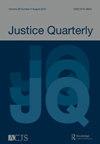推动公众支持:当法律以受害者的名字命名时,对法律的支持更高
IF 2.6
1区 社会学
Q1 CRIMINOLOGY & PENOLOGY
引用次数: 1
摘要
摘要尽管以受害者的名字命名法律具有潜在的象征意义、政治意义和实践意义,但目前尚不清楚这种做法是否会影响公众对法律本身的看法。我对1000名美国成年人进行了一项随机的小插曲调查实验,以确定对拟议的分心驾驶法的支持及其授权的惩罚是否受到是否以受害者的名字命名以及受害者的种族、性别和年龄的影响。我发现,以受害者的名字命名法律增加了对法律和整体授权惩罚的支持,但这种影响在所有命名的法律中并不一致,而是由特定类型的命名受害者驱动的。特别是,研究结果表明,“理想受害者”的形象可能已经发生了变化或扩大,更加强调非裔美国女性,而较少强调白人女性。本文章由计算机程序翻译,如有差异,请以英文原文为准。
Driving Public Support: Support for a Law is Higher When the Law is Named After a Victim
ABSTRACT Despite the potential symbolic, political, and practical importance of naming a law after a victim, it is unclear whether this practice influences public opinion about the law itself. I conducted a randomized vignette survey experiment on 1,000 American adults to determine if support for a proposed distracted driving law, and the punishment it authorized, was influenced by whether it was named after a victim, as well as the victim’s race, gender, and age. I found that naming a law after a victim increased support for the law and the punishment authorized overall, but this effect was not consistent across all named laws, and instead was driven by specific types of named victims. In particular, results suggest the image of the “ideal victim” may have shifted or expanded to place greater emphasis on African American women, and less emphasis on White women.
求助全文
通过发布文献求助,成功后即可免费获取论文全文。
去求助
来源期刊

Justice Quarterly
CRIMINOLOGY & PENOLOGY-
CiteScore
6.90
自引率
6.20%
发文量
44
期刊介绍:
Justice Quarterly (JQ) is an official publication of the ACJS. JQ is a refereed, multi-disciplinary journal that publishes theoretical, empirical and interpretive studies of issues related to criminal justice. JQ is indexed in Criminology and Penology Abstracts, Police Science Abstracts, Criminal Justice Periodical Index, and Criminal Justice Abstracts. In the past decade, JQ has become a premier journal and it continues to be a major forum for criminal justice related scholarship, making it an essential part of any library"s holdings.
 求助内容:
求助内容: 应助结果提醒方式:
应助结果提醒方式:


